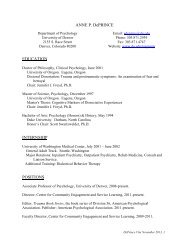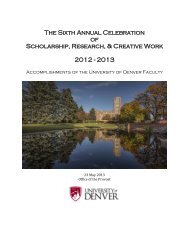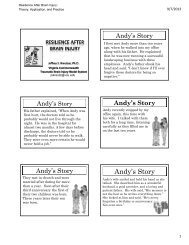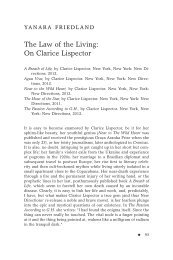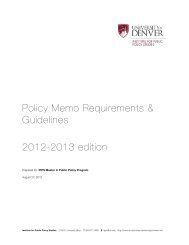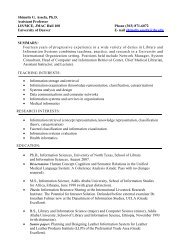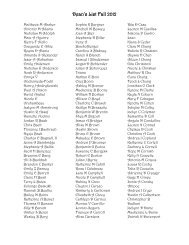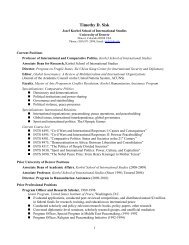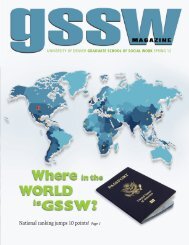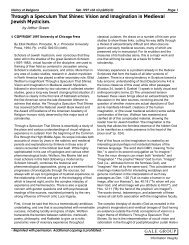Chien-Kai Chen, “China and Taiwan: A Future of Peace? A Study of ...
Chien-Kai Chen, “China and Taiwan: A Future of Peace? A Study of ...
Chien-Kai Chen, “China and Taiwan: A Future of Peace? A Study of ...
Create successful ePaper yourself
Turn your PDF publications into a flip-book with our unique Google optimized e-Paper software.
Josef Korbel Journal <strong>of</strong> Advanced International Studies - 23<br />
Pan-Green c<strong>and</strong>idate, Hsieh, to change his attitudes towards economic openness <strong>and</strong> <strong>Taiwan</strong>ese<br />
identity in order to attract these people to vote for him. Therefore, it is reasonable to argue that<br />
Hsieh, though not a pure pro-openness <strong>and</strong> pro-Chinese identity politician like Ma, would be a<br />
president different from <strong>Chen</strong> Shui-Bian if he was elected, <strong>and</strong> the likelihood <strong>of</strong> war in the<br />
<strong>Taiwan</strong> Strait would still decrease to some extent under this counterfactual circumstance. The<br />
finding in this section can be summarized as figure 3 below.<br />
Figure 3: The relationship among the cross-strait economic ties, <strong>Taiwan</strong>’s domestic<br />
politics, <strong>and</strong> the cross-strait relations<br />
the growing economic ties between China <strong>and</strong> <strong>Taiwan</strong><br />
↓<br />
political coalition <strong>of</strong> Pan-Blue <strong>and</strong> <strong>Taiwan</strong>ese businesspeople in China<br />
vs.<br />
political coalition <strong>of</strong> Pan-Green <strong>and</strong> <strong>Taiwan</strong>ese farmers <strong>and</strong> unskilled workers<br />
<strong>and</strong><br />
<strong>Taiwan</strong>ese businesspeople in China are becoming much politically <strong>and</strong><br />
economically stronger<br />
↓<br />
a Pan-Blue pro-Chinese identity president<br />
or<br />
a Pan-Green president who has weak <strong>Taiwan</strong>ese identity<br />
↓<br />
the likelihood <strong>of</strong> war decreases<br />
Conclusion<br />
Whether the growing economic ties between China <strong>and</strong> <strong>Taiwan</strong> lead to peace in the <strong>Taiwan</strong><br />
Strait is an academic <strong>and</strong> pragmatic question. Many arguments concerning this issue tend to<br />
ignore the complexity <strong>of</strong> <strong>Taiwan</strong>’s domestic politics, which has played a very important role in<br />
the development <strong>of</strong> China-<strong>Taiwan</strong> relations since the 1990s when <strong>Taiwan</strong>ese nationalism<br />
emerged in the course <strong>of</strong> <strong>Taiwan</strong>’s democratization. If we take <strong>Taiwan</strong>’s domestic politics into<br />
account, we can find that growing economic ties between China <strong>and</strong> <strong>Taiwan</strong> have a positive<br />
effect on China-<strong>Taiwan</strong> relations. My conclusion is based on two findings.<br />
First, <strong>Taiwan</strong>’s domestic politics, in which the pro-<strong>Taiwan</strong>ese identity force <strong>and</strong> the pro-<br />
Chinese identity force are competing with each other, has a critical effect on China-<strong>Taiwan</strong><br />
relations. Since 2000, <strong>Taiwan</strong>’s domestic politics has been dominated by these two political<br />
forces represented by pro-<strong>Taiwan</strong>ese identity Pan-Green <strong>and</strong> pro-Chinese identity Pan-Blue.<br />
Given that <strong>Taiwan</strong>’s president has large power to deal with issues concerning national security,<br />
foreign affairs <strong>and</strong> cross-strait relations, which force wins <strong>Taiwan</strong>’s presidential election matters.



